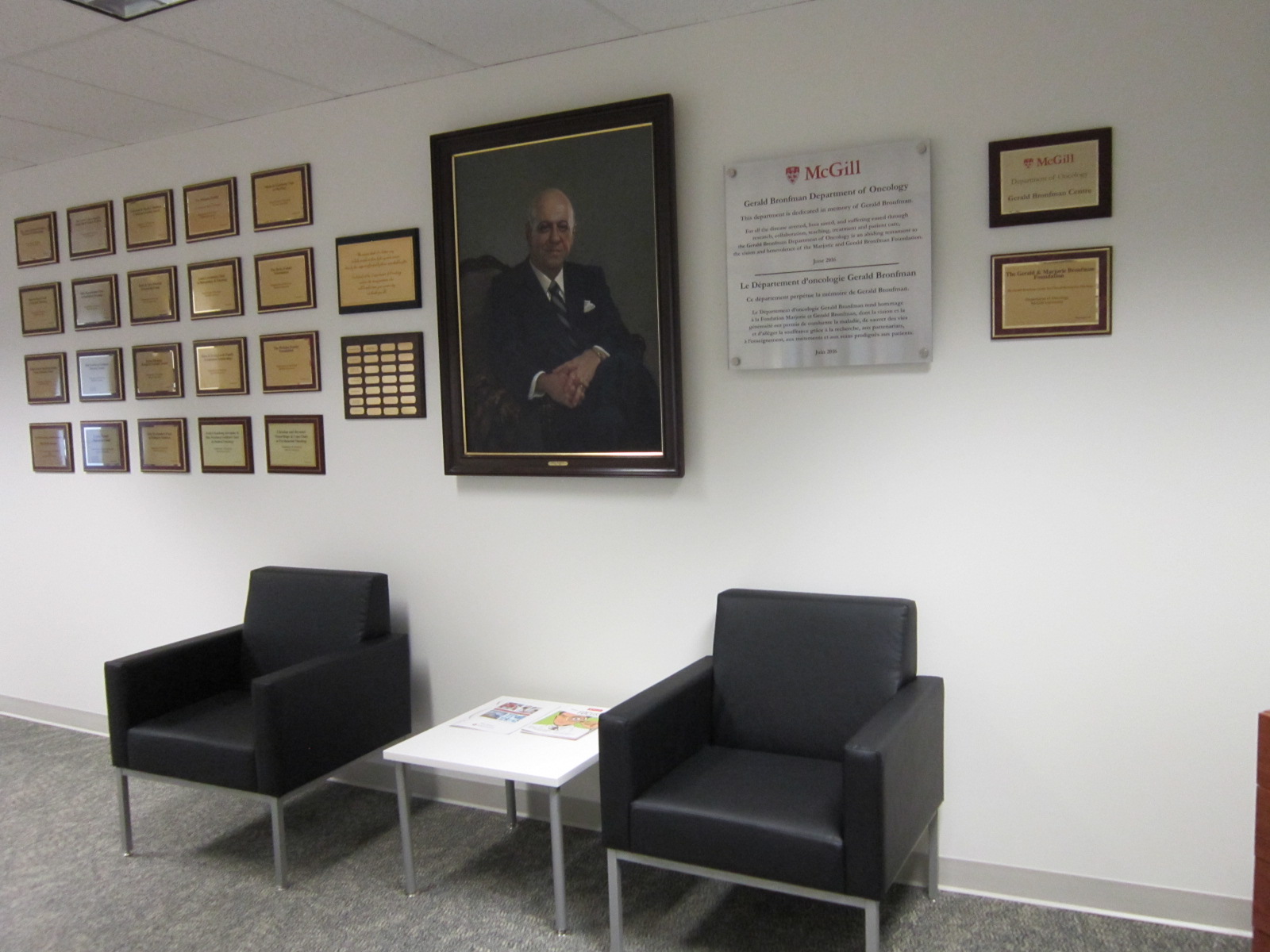
Celebrating 30 Years: McGill Oncology - Traveling through time, looking back and seeing the future
The McGill University Department of Oncology was founded in 1990 by then Dean of Medicine, Dr. Richard Cruess. It was the first such department in Canada, having been made possible by a generous donation from the Bronfman family in memory of Minda de Gunzburg, daughter of Samuel and Saidye Bronfman and wife of Baron Alain de Gunzburg. A second generous donation from the Marjorie and Gerald Bronfman Foundation allowed clinical research in oncology at McGill to flourish, and in May 1992, the Gerald Bronfman Centre for Clinical Research in Oncology officially opened its doors. That building became the home base for the Department of Oncology and the location of the department’s administrative offices. Other departmental programs headquartered in the building included the centralized Clinical Research Program, the Division of Cancer Epidemiology, Cancer Genetics, the Cancer Nutrition-Rehabilitation program, and the McGill Programs in Whole Person Care. The inaugural Chair of the Department was Dr. Brian Leyland Jones (1990-2000). In 1995 Dr. Henry Shibata was appointed as Associate Chair and subsequently became Interim Chair (2000-2001). Dr. Gerald Batist served as Chair from 2001 to 2010. Dr. Eduardo Franco became Interim Chair in 2011 and was appointed Department Chair in 2013.
Other endowments that were established in the early days of the department include the Helen and Sam Steinberg Family Career Award and the Flanders Chair in Palliative Care. The Department of Oncology was formed at a time when, as nearly everywhere in Canada, clinical oncology was largely invested in a department of radiation therapy while medical oncology was either a subunit of hematology or else a standalone division within a department of medicine. The McGill Cancer Centre (MCC), originally founded by Dean Samuel Freedman under the directorship of Dr. Phil Gold, was a grouping of affiliated research laboratories at the Medical Faculty Building. In time, the MCC developed a clinical research program under the leadership of Dr. Richard Margolese. With his great success in the National Surgical Adjuvant Breast and Bowel Project, he joined with other clinical leaders—Drs. Henry Shibata and Lawrence Hutchison, among them—to generate successful Cancer and Leukemia Group B funding and to initiate participation in the National Cancer Institute of Canada (NCIC) at a time when little investigator-initiated clinical research was occurring.
The new Department of Oncology had a classical divisional structure in which the erstwhile Department of Radiation Oncology nobly accepted its role as a division within the department, the MCC became the Division of Basic Cancer Research, and MCC Clinical Research was recognized as the new Division of Clinical Oncology. To these were added the divisions of Epidemiology and of Palliative Care. However, right from the start, it was evident that modifications were required. Within the first 18 months, “Clinical Trials Operations” was established and a Pediatric Oncology division was created, as was a transdivisional section of Experimental Therapeutics, with the goal of generating a greater number of investigator-initiated trials.
Further changes followed, such that by 1995, the Division of Clinical Oncology was split into the divisions of Medical Oncology and of Surgical Oncology. In addition, 13 trans-hospital multidisciplinary research sections were created to develop, review, and oversee clinical research activities for various tumour types—for example, leukemia, lymphoma, melanoma, neuro-oncology, endocrine/biologics, breast cancer, and so on. The department encompassed research and training at the Montreal General Hospital, The Royal Victoria Hospital, St. Mary’s Hospital, and the Sir Mortimer B. Davis–Jewish General Hospital. In addition to Clinical Trials Operations at the Gerald Bronfman Centre, the early 1990s saw the creation of the Clinical Research Unit at the Sir Mortimer B. Davis–Jewish General Hospital, the focal point for phase I and complex phase II clinical trials. As clinical care and research in oncology were being structured and expanded, the department also gave top priority to oncology teaching and training. By the mid-1990s, a Medical Education Committee to address undergraduate education and four oncology residency training programs (medical, radiation, surgical, and hematologic oncology) were established. Furthermore, a new lecture series, the bi-annual Cedars Visiting Professorships was created in the early 1990s to supplement Oncology Grand Rounds. Over the years, that lecture series changed and evolved to become the Visiting Speakers Program in Oncology. The latter program, a joint effort with Université de Montréal, sponsors 8-15 visiting professors annually.
Under the Chairmanship of Dr. Eduardo Franco, the Department, with the support of the Faculty of Medicine, held its annual Gerald Bronfman Centre Symposium and Awards Ceremony (2011-2015) in honour of its benefactors, Marjorie and Gerald Bronfman. In June 2016 the Department of Oncology was renamed the Gerald Bronfman Department of Oncology and on February 9, 2017 the Department's Administration, Clinical Research Program, Visiting Speakers Program in Oncology, Postgraduate Medical Education and Division of Cancer Epidemiology moved to a suite of offices at 5100 de Maisonneuve Blvd. In the fall of 2017 the Department began holding its annual Gerald Bronfman Department of Oncology Distinguished Lecture and Awards Ceremony (2017-present). Also in the fall of 2017 Dr. Joanne Alfieri was appointed as the Inaugural Director of Education for the Department and in 2019 Dr. Franco created the Chair's Executive Committee. Dr. Franco also created the Focus on Faculty series (June 2015 - present) as a way to showcase the activities and interests of the Department's faculty members. In January 2020 the Department launched a Graduate Diploma in Oncology.
Source: Batist, G. and Shinder, GA. The McGill University Department of Oncology: structure depicts the shape of evolving knowledge. Current Oncology; 15(3): 28-35, 2008.